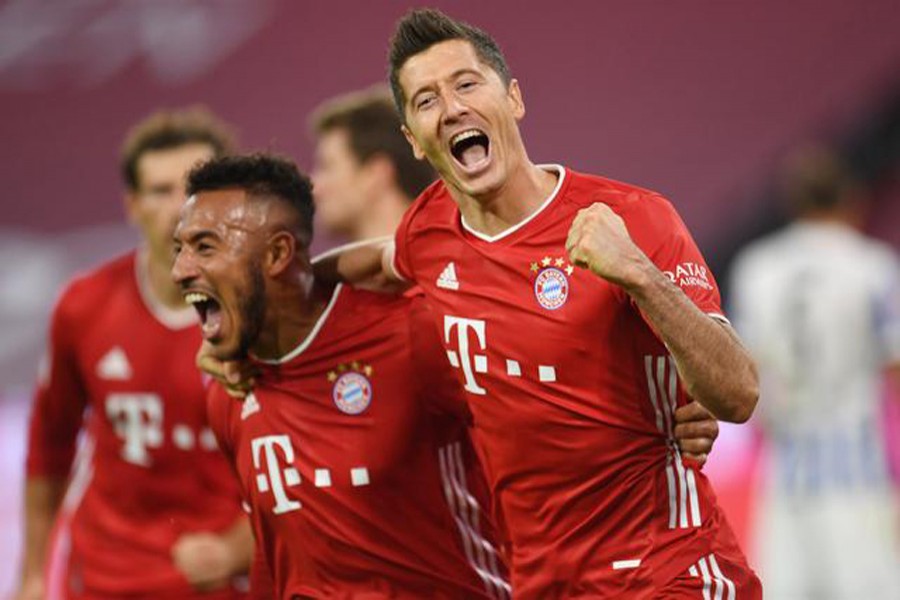Bayern Munich’s monopoly behind the fall of quality in Bundesliga

Published :
Updated :

Bundesliga has been one of the top five European Leagues for quite some time now. But one thing that has been affecting the league badly is the complete dominance of FC Bayern Munich. The last team to win the Bundesliga apart from Bayern Munich was Borussia Dortmund back in the 2011-12 season under the management of current Liverpool Boss Jürgen Klopp, when they won back to back league titles.
After that, Bayern Munich have completely dominated Bundesliga for the rest of the decade and as of the 2020-2021 season, they are more likely to clinch their ninth domestic title in a row. They have also been the only Bundesliga club to achieve European success in the 21st Century. Although Bayern Munich have consolidated their place as a constant threat to reckon in Europe, the difference in quality between Bayern and other Bundesliga teams have remained extremely high.
This is the reason why fans around the world have been critical about the Bundesliga. Along with French Ligue 1, Bundesliga has often been referred to as a ‘Farmer's League’ or a ‘Feeder League,’ where clubs are constantly developing talents only to sell them to the biggest teams in the league-- Bayern and PSG respectively-- or to the European Elites.
Focusing solely on the Bundesliga, Bayern Munich have their fair share of responsibility in weakening the league by buying the most promising players from their rivals. When Jürgen Klopp’s Dortmund was becoming a dominant force in Europe, Bayern Munich bought three of the most important players from that team in three seasons.
Mario Götze, Robert Lewandowski and Mats Hummels were among the most important players in Klopp's Dortmund team who were looking very much in shape to challenge Bayern for the title in almost every season. But the sale of these players made the Dortmund team significantly weaker.
Bayern have also been accused of showing overt arrogance and destroying the morale of the Dortmund team as the signing of Götze was announced just 36 hours before the UCL semi-final clash between Dortmund and Real Madrid. Dortmund eventually went to the final and faced Bayern Munich, a game in which they lost to 2-1; however, one of the biggest highlights of the match was Götze cheering for the Dortmund team from the sidelines, as he was ruled out of the final due to a hamstring injury.
Götze eventually returned to Dortmund in the 2016-17 season, but was largely a shadow of his former self for his physical complexities. Robert Lewandowski was another man behind Klopp's domestic success who eventually went to Bayern for a free transfer in 2014-15. He has achieved a considerable amount of success on a personal as well as team level, the pinnacle of which came last year as he was crowned the Best player in the World by FIFA after a successful treble-winning season with Bayern where he was the top scorer in all three competitions.
Mats Hummels, who was the captain of the Dortmund team also joined the Bavarians in the 2016-17 season, eventually making his return to his former team in the 2019-2020 season after achieving significant domestic success with Bayern. Nevertheless, Dortmund was never the same again as they kept fighting for a mere spot in the UCL, let alone competing for the title.
RB Leipzig have recently risen through the ranks of German football and many are considering them to be the only team capable of challenging Bayern's hegemony in the Bundesliga. Unlike most of the German clubs, Leipzig is run by the Corporation Red Bull and they actually have a very decent financial structure.
For a team that was established in 2009, they are faring pretty well and even reached the semi-finals of UCL in 2019-20. Then again, Bayern have signed Dayot Upamecano from Leipzig, a promising young french defender who had been instrumental in their success, who is expected to join next July, when the ongoing season ends.
However, Bayern declared the signing beforehand, a similar case like the one of Mario Götze, which is considered to be disrespectful. Bayern have been fishing talents from all the Bundesliga sides. Some of their most significant signings this century include Ballack and Lucio from Leverkusen, Pizzaro and Klose from Bremen, Gomez from Stuttgart, and Neuer and Goretzka from Schalke.
One thing common in all those transfers is all of the players were the best performers of their respective teams. And their signings came just after a season or two when their respective clubs put up a title fight with Bayern.
Unlike other European elites, Bayern seemingly don't spend much in transfers and prefer getting their talents from Bundesliga clubs. This policy of Bayern is affecting the growth of Bundesliga, as the league has become monotonous and predictable.
Contrary to other top European leagues, Bundesliga has a unique rule named 50+1. According to the rule, a club won’t be able to play the league if any commercial or foreign investor owns more than 49 per cent share of the club. In other words, the club's official members have to own at least 51 per cent shares.
Critics consider this to be the principal reason behind the dominance of Bayern in the league as it is virtually impossible for foreign investors to buy significant shares of a club and make them title contenders. The uprise of the newer clubs like Manchester City, Chelsea and PSG wouldn’t be possible with this rule being active there.
Although many are in favour of this policy due to the persistent view about traditionalism in German football, this rule needs serious assessment since Bayern's domination has been proved to be detrimental for Bundesliga.
Kabir is a student of Economics at the University of Dhaka.


 For all latest news, follow The Financial Express Google News channel.
For all latest news, follow The Financial Express Google News channel.